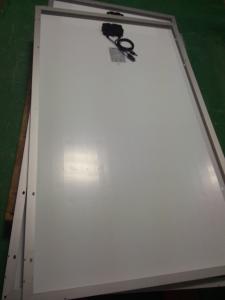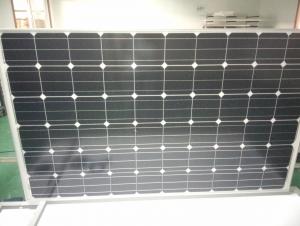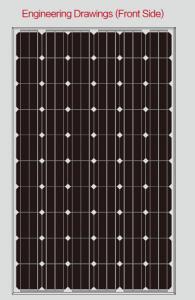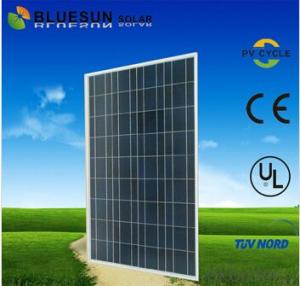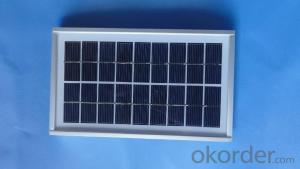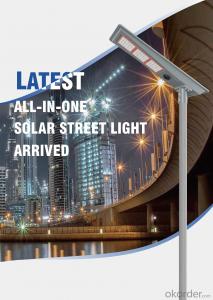Soalr Panel (240w poly) with TUV and UL Certification
- Loading Port:
- Shanghai
- Payment Terms:
- TT or LC
- Min Order Qty:
- -
- Supply Capability:
- 3000pcs watt/month
OKorder Service Pledge
OKorder Financial Service
You Might Also Like
Mechanical Characteristics
Model GS-P660240
Max-power Pm(W) 240
Max-power voltage Vmp(V) 30.7
Max-power current Imp(A) 8.15
Open-circuit voltage Voc(V) 37.3
Short-circuit current Isc(A) 8.85
Dimension(mm) 1650*992*45mm
Weight(kg) 19
Operating Conditions
Operating Temperature -40~85°c
Storage Temperature -40~85°c
Maximum system voltage DC 1000V
Temperature and Coefficients
NOCT 48± 2°c
Temperature coefficient of Voc(%/K) -0.34
Temperature coefficient of Isc(%/K) 0.09
Power temperature coefficient(%/K) -0.37
Quality and Safety
1. Rigorous quality control meets the highest international standards.
2. High-transmissivity low-iron tempered glass, strong aluminium frame.
3. Using UV-resistant silicon.
4. IS09001/14001/CE/TUV/UL
Warranty
--Peak power of single module is guaranteed in±3% power tolerance
--3 years limited warranty on material and workmanship
--Limited power warranty:10 years 90% and 25 years 80% limited warranty for minimum power output
Package
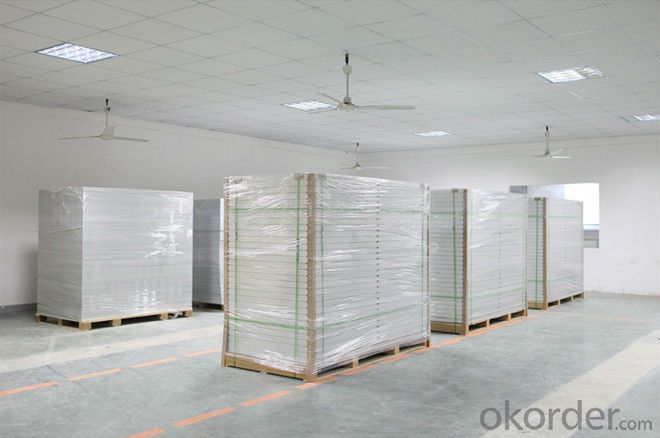
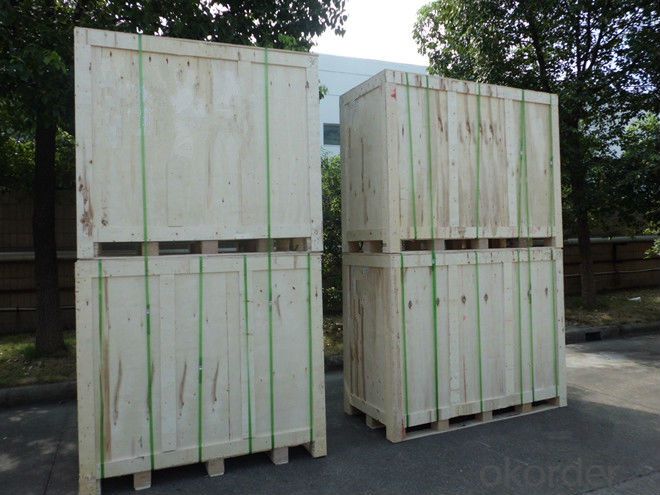
FAQ
I. Will you focus on the safety of the goods during transportation?
Yes, Safety of the cargo is the primary element that we would consider on transportation.
II..How would guarantee the quality will meet the requirements of your clients?
Before shipment, we will have inspection for each batch of goods.
III..What certificates do you have?
IEC,UL,TUV,CSA,etc.
IV..Can you do OEM according to clients’ requirements?
Yes, we have our own brand while we can provide OEM service.
- Q:Can solar panels be installed in areas with frequent power outages?
- Yes, solar panels can be installed in areas with frequent power outages. In fact, solar panels can be a great solution for such areas as they generate electricity from sunlight, reducing dependency on the grid. With the addition of energy storage systems, solar panels can provide uninterrupted power supply during outages, making them a reliable and sustainable option.
- Q:The average solar panel produces 0% of the energy that is put into it. What is happening to the other 90%? Is it being reflected or is it being obsorbed by materials that are not a part of the solar cell? Is it possible to one day have near 00% efficient solar cell technology?
- Unlikely that we gan get to near 00% efficiency, although there is room for improvement. In the meantime, don't pooh-pooh 0% efficiency. That's about the rate of energy transfer up a food pyramid, perhaps a little less at the solar to plant level. As this manages to provide the basis for most of life on earth, it's nothing to sneeze at. As far as the other 90% goes, I would guess that much of it is reflected.
- Q:Can someone tell me the average savings you get PER solar panel installed? I do not have the money to invest in a bunch of them at once, so I am forced to buy one at a time, when I have the money. So how much can I expect to save after I buy the first one?
- I am afraid you are in for some disapointment. A typical solar panel might put out something over 00 watts, and cost a pretty big bundle. Then, what would you do with the power? It will be low voltage DC. You could charge a battery, or run a DC appliance. You would get less than ten cents worth of electricity per day. If you wanted to use it for household appliances, you would need an inverter. More big bucks. Type solar panels in the green search box at the top of this page, and read previous Q A. Also do the same on the Internet. Sorry to be a wet blanket.
- Q:Can solar panels be used for irrigation systems?
- Yes, solar panels can be used for irrigation systems. Solar panels can generate electricity which can power the pumps and other components of an irrigation system, reducing the reliance on traditional power sources and making it a more sustainable and cost-effective solution.
- Q:Are there different types of solar panels?
- Yes, there are different types of solar panels. The most common types are monocrystalline, polycrystalline, and thin-film solar panels. Each type has its own unique manufacturing process and efficiency levels, making them suitable for different applications and budgets.
- Q:Can solar panels be installed on the ground?
- Yes, solar panels can be installed on the ground. Ground-mounted solar panel systems are a popular alternative to rooftop installations, especially in areas with ample available space. They are often used for large-scale solar projects, such as solar farms or commercial installations, but can also be installed in residential settings if space allows. Ground-mounted panels offer flexibility in terms of orientation and tilt angle, optimizing energy production.
- Q:Can solar panels store excess energy?
- No, solar panels cannot store excess energy. However, additional equipment such as batteries or energy storage systems can be installed alongside solar panels to store any surplus energy generated for later use.
- Q:I have seen DIY software which explains everything for novices. Specifically, how to build your own solar panels and tie them into your home electrical system for about $00 in parts.Has anyone tried doing this? Was it easy?
- Your location could effect this answer significantly.If you are in an area that requires considerable amounts of heating,and you are looking to save some money with a homemade project,try solar-thermal.S-T is easy and cheap ,can be built from common scrapyard materials,and will give you a great knowledge gateway . The orientation and tracking skills you will learn can be used later with PVs if you choose,or you can make better concentrators for the solar-thermal and build yourself a sterling or rankin cycle engine to generate electricity.If u need heat,or even hot water, u can start saving the money u put into the system immediately. Concentrated PV is here and now ,but, in a year or 2 it will be cheap and readily available and thats when PV will start to approach the efficiency of solar-thermal.there a great sites and groups on just S-T out there ,join 'em,check 'em out,read the free info from those who have built working systems,and you will probably find a more useful method of saving money and the planet at the same time.Just remember to approach it as a hobby/learning experience at first.Start with solar-thermal....theres a reason the anti-greenies point at the ROIs on PVs,great arguement against alt energy,but over the last 30 years I've shut up quite a few skeptics with my solar-thermal projects ,esp. when coupled with geothermal...have fun,make a local scrapyard owner/worker ur freind..................GEOD
- Q:Can solar panels be installed on desalination plants?
- Yes, solar panels can be installed on desalination plants to generate renewable energy and help power the plant's operations. This integration of solar power can reduce the reliance on fossil fuels and make the desalination process more sustainable.
- Q:I am doing a report about solar power and I need to know what determines the amount of electricity produced?example: exposure to sun, angle of panel, qualityplease tell me as much as you canmuch appreciated
- It depends on what you mean by amount of electricity. Normally that would mean the total energy produced over a given period. In that case, the main factors are ) Efficiency of the solar cells 2) Total irradiation received: incident radiation density times the solar panel area, and the angle of the incident radiation. Item ) is determined by the materials and method of construction of the solar cells Item 2) depends on the location of the panel, both on earth's surface (latitude), time of year, and how the panel is oriented with respect to the horizontal. Altitude of the location can also be a factor. Prevailing weather conditions, number of cloudy days, etc. are important. Independent of these parameters, larger area means more electricity.
1. Manufacturer Overview |
|
|---|---|
| Location | |
| Year Established | |
| Annual Output Value | |
| Main Markets | |
| Company Certifications | |
2. Manufacturer Certificates |
|
|---|---|
| a) Certification Name | |
| Range | |
| Reference | |
| Validity Period | |
3. Manufacturer Capability |
|
|---|---|
| a)Trade Capacity | |
| Nearest Port | |
| Export Percentage | |
| No.of Employees in Trade Department | |
| Language Spoken: | |
| b)Factory Information | |
| Factory Size: | |
| No. of Production Lines | |
| Contract Manufacturing | |
| Product Price Range | |
Send your message to us
Soalr Panel (240w poly) with TUV and UL Certification
- Loading Port:
- Shanghai
- Payment Terms:
- TT or LC
- Min Order Qty:
- -
- Supply Capability:
- 3000pcs watt/month
OKorder Service Pledge
OKorder Financial Service
Similar products
New products
Hot products
